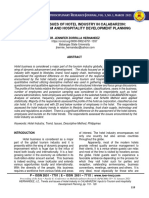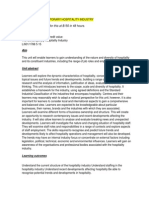Moth
Uploaded by
abuyavenmcpaulMoth
Uploaded by
abuyavenmcpaulLEARNING MODULE
Trends in Hospitality Industry
WEEK 3
\\\
OBJECTIVES:
At the end of the lesson, the students should be able to:
1. Identify the issues, challenges, trends and innovation in the hospitality and tourism industry;
2. The learners will define the different issues and challenges; and
3. Explain the importance of topic.
INTRODUCTION:
The hospitality industry is constantly evolving to meet the changing needs and preferences of
modern consumers. Driven by advancements in technology, growing environmental awareness,
and shifting customer priorities, the industry has embraced trends that enhance guest
experiences, operational efficiency, and sustainability. From digital transformation and
contactless technologies to wellness-focused offerings and experiential travel, these trends
reflect a dynamic sector that prioritizes innovation and adaptability. Understanding and adopting
these developments is essential for businesses to remain competitive and deliver exceptional
services in an ever-changing global market.
DISCUSSION:
Rapid Growth in Vacation Ownership
Vacation ownership is the fastest-growing segment of the lodging industry and is likely to
continue growing as the baby boomers enter their fifties and sixties in the U.S.A. The World
Tourism Organization has called timeshares one of the fastest-growing sectors of the travel and
tourism industry. Hospitality companies are adding brand power to the concept with corporations
like Marriott Vacation Club International, the Walt Disney Company, Hilton
Hotels, Hyatt Hotels, Promus’ Embassy Suites, Inter-Continental, and ever Four Seasons
participating in an industry that has grown rapidly in recent years.
Hospitality and Tourism Industry
Grade 7
LEARNING MODULE
Resort Condominiums International (RCI), the largest vacation ownership exchange (that allows
members to exchange vacations with other locations), has more than 2.8 million-member
families living in 200 countries. Three thousand seven hundred participating resorts and
members can exchange vacation intervals for vacations at any participating resort. North
America remains the global leader with nearly half of all the participating resorts and more than
2 million owners. Europe is second with approximately 22 percent of owners worldwide and more
than 1,000 resorts. Timeshare resorts are found around the globe in popular vacation areas near
beaches, rivers, lakes, and mountains, and even in major cities.
Integration & Globalization
Vertical integration is a trend that began a few years ago. Lodging companies realized that
guests’ accommodation needs were not just at one level; rather, they seemed to vary by price
and facilities/amenities. Almost all major lodging companies now have properties in each
segment of the market.
The future of the lodging industry involves globalization. Companies cannot grow unless they
venture beyond the United States. American hospitality chains and their management
techniques were in demand by many developing countries that wanted premium-name hotels.
An extensive survey of the condition of the hospitality would have shown that substantial
amounts of money would be necessary to maintain the hospitality’s condition. The hospitality
industry is thus at the very core of the globalization of international business. Hospitality
companies therefore need to consider the implications of the global context in which they operate
and must be prepared to address the questions that arise from this changing environment.
Globalization will ultimately touch virtually all aspects of the hospitality industry. Increasingly,
customers, management processes, employees, products, and sources of capital will be
competed for and will move across national boundaries. Competition in the future will come from
global entities with the advantages that globalization brings.
New Management
The complex forces of capacity control, safety and security, capital movement, and technology
issues will require a future management cadre that is able to adapt to rapid-paced change across
all the traditional functions of management.
The growing complexity of customer/employee interaction, driven by technology and the
information age, will shape human resources needs in the future. The customer, armed with
more information, will expect frontline and other hospitality staff to be at least as knowledgeable
about the firm’s offerings as they are themselves. This will be difficult in an industry characterized
by low-skilled, low-paid personnel and a high degree of cultural and behavioral diversity among
its employees. Visioning the future: major forces driving change in the hospitality industry’
considers seven areas decisive to the future development of the industry. Each is examined to
determine the scope and complexity of the issue and the timing of its impact. That is assets and
capital, health and safety, new management, marketing, distribution and capacity management,
technology, sustainable development, and social issues.
Hospitality and Tourism Industry
Grade 7
LEARNING MODULE
EVALUATION:
INSTRUCTION: Answer the questions Briefly in 4-5 sentences each questions.
1. In your opinion, which specific challenge or trend discussed in the industry holds the
greatest impact and importance? Why?
2. Why is it important to keep up with the latest Hospitality trends?
REFFRENCES
Learning Materials are uploaded at https://www.deped.gov.ph/wp
Prepared by: Checked by: Noted by:
RICOHERMOSO, RENIEL A. GRANA, HANNA ANGELINE R. PAGLINAWAN, MA. RACHEL B.
Pre-service Student Cooperating Teacher Teacher Head
Hospitality and Tourism Industry
Grade 7
You might also like
- Student ID Application Ref Full Name: Authorised Agent: Offer IssuedNo ratings yetStudent ID Application Ref Full Name: Authorised Agent: Offer Issued3 pages
- Day 9-12 (Issues in the Hospitality Industry )No ratings yetDay 9-12 (Issues in the Hospitality Industry )44 pages
- Issues, Challenges, and Trends, That Facing Hospitality IndustryNo ratings yetIssues, Challenges, and Trends, That Facing Hospitality Industry6 pages
- Issues-and-Challenges-in-Hospitality-and-TourismNo ratings yetIssues-and-Challenges-in-Hospitality-and-Tourism5 pages
- Issues, Challenges and Trends in Hospitality Industry100% (1)Issues, Challenges and Trends in Hospitality Industry6 pages
- Course File HMD Quality Service Revised SecondNo ratings yetCourse File HMD Quality Service Revised Second63 pages
- Trends and Issues of Hotel Industry in CALABARZON Inputs To Tourism and Hospitality DevelopmentNo ratings yetTrends and Issues of Hotel Industry in CALABARZON Inputs To Tourism and Hospitality Development9 pages
- Module 1 Macro Perspective of Tourism and HospitalityNo ratings yetModule 1 Macro Perspective of Tourism and Hospitality23 pages
- Factors Affecting the Growth of the Hospitality and Tourism IndustryNo ratings yetFactors Affecting the Growth of the Hospitality and Tourism Industry4 pages
- Recreational Leisure Management Midterm PeriodNo ratings yetRecreational Leisure Management Midterm Period14 pages
- THE Contempor ARY Hospitality Industry: BTEC Higher National Diploma (HND) in Hospitality ManagementNo ratings yetTHE Contempor ARY Hospitality Industry: BTEC Higher National Diploma (HND) in Hospitality Management16 pages
- Lesson 3 Issues in the Hospitality Industry, Challenges confronting the Hospitality Industry, and Trends in the Hospitality IndustryNo ratings yetLesson 3 Issues in the Hospitality Industry, Challenges confronting the Hospitality Industry, and Trends in the Hospitality Industry4 pages
- LESSON 2 The accommodation Sector in a Global PrespectiveNo ratings yetLESSON 2 The accommodation Sector in a Global Prespective6 pages
- UNIT 1 The Contemporary Hospitality IndustryNo ratings yetUNIT 1 The Contemporary Hospitality Industry5 pages
- Staycation As A Marketing Tool For Survival Post Covid-19 in Five Star Hotels in Pune CityNo ratings yetStaycation As A Marketing Tool For Survival Post Covid-19 in Five Star Hotels in Pune City10 pages
- Travel and Tourism Management: An Exceptional Field of Career and Personality Development .No ratings yetTravel and Tourism Management: An Exceptional Field of Career and Personality Development .11 pages
- Chapter One 1.1 Background To The StudyNo ratings yetChapter One 1.1 Background To The Study19 pages
- Knowledge Horizons - Economics: Casiana RĂDUȚNo ratings yetKnowledge Horizons - Economics: Casiana RĂDUȚ6 pages
- Quality Services Management I Tourism and HospitalityNo ratings yetQuality Services Management I Tourism and Hospitality5 pages
- ) A Study On Attrition in Hospitality Industry100% (4)) A Study On Attrition in Hospitality Industry33 pages
- Module 4 Macro Perspective of Tourism and Hospitality100% (1)Module 4 Macro Perspective of Tourism and Hospitality52 pages
- Growth Drivers and Challenges in Indian Hotel Industry: Kuldeep KumarNo ratings yetGrowth Drivers and Challenges in Indian Hotel Industry: Kuldeep Kumar5 pages
- Executive Summary: The Title of The Project Is Hotel Marketing'sNo ratings yetExecutive Summary: The Title of The Project Is Hotel Marketing's110 pages
- Hospitality Branding, Volume 2: New Insights and Case StudiesFrom EverandHospitality Branding, Volume 2: New Insights and Case StudiesNo ratings yet
- Research Topic The Impact of Talent Management On Job SatisfactionNo ratings yetResearch Topic The Impact of Talent Management On Job Satisfaction16 pages
- Q2 - WS - Music and Arts 7 - Lesson 2 - Week 2No ratings yetQ2 - WS - Music and Arts 7 - Lesson 2 - Week 24 pages
- Application Checklist: (Please Tick For Documents Submitted)No ratings yetApplication Checklist: (Please Tick For Documents Submitted)2 pages
- Founding Principal Application and Information Packet - Detroit Achievement AcademyNo ratings yetFounding Principal Application and Information Packet - Detroit Achievement Academy5 pages
- Learn Project Management For FREE With GOOGLENo ratings yetLearn Project Management For FREE With GOOGLE3 pages
- Skillslash Digital Marketing Master Course With Gen-AiNo ratings yetSkillslash Digital Marketing Master Course With Gen-Ai17 pages
- Complete Download (Ebook) Graph-Based Representation and Reasoning: 27th International Conference on Conceptual Structures, ICCS 2022, Münster, Germany, September 12–15, 2022, Proceedings by Tanya Braun, Diana Cristea, Robert Jäschke, (eds.) ISBN 9783031166624, 3031166620 PDF All Chapters100% (7)Complete Download (Ebook) Graph-Based Representation and Reasoning: 27th International Conference on Conceptual Structures, ICCS 2022, Münster, Germany, September 12–15, 2022, Proceedings by Tanya Braun, Diana Cristea, Robert Jäschke, (eds.) ISBN 9783031166624, 3031166620 PDF All Chapters71 pages
- Woman Changes The World CBSE Class 8 WorksheetNo ratings yetWoman Changes The World CBSE Class 8 Worksheet3 pages
- GLIMPSES - A Compilation of Uncensored Real Life Experiences With Mental Illness 30-07-110% (1)GLIMPSES - A Compilation of Uncensored Real Life Experiences With Mental Illness 30-07-11329 pages
- Lesson 1 - Academic Reading and WritingNo ratings yetLesson 1 - Academic Reading and Writing15 pages
- 101 American Idiom - Understanding and Speaking English Like An A33% (3)101 American Idiom - Understanding and Speaking English Like An A31 pages
- National News (Print) : 1st Place - Innocent Anguyo, John Semakula, Fred Turyakira, Godfrey Ojore, Jolly Owiny, Ali Mao and Richard Drasimaku, New VisionNo ratings yetNational News (Print) : 1st Place - Innocent Anguyo, John Semakula, Fred Turyakira, Godfrey Ojore, Jolly Owiny, Ali Mao and Richard Drasimaku, New Vision2 pages

























































































